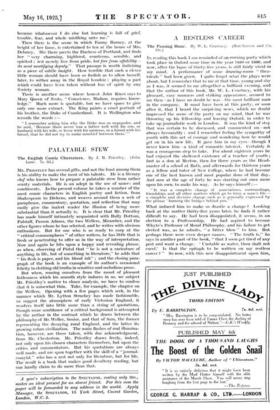PALATABLE STEW
The English Comic Characters. By J. B. Priestley. (John Lane. is. 6d.) MR. PRIESTLEY has several gifts, and not the least among them is his ability to make the most of his talents. He is a literary chef who knows how to prepare a palatable stew from rather
scanty materials. He is an adept in the use of sauces and condiments. In the present volume he takes a number of the
most comic characters in English poetry and fiction, from Shakespeare to Dickens, and weaves around them a web of paraphrase, commentary, quotation, and reflection that may easily give the inalert reader the illusion of being more substantial than it actually is. It is clear that Mr. Priestley has made himself intimately acquainted with Bully Bottom, Falstaff, Parson Adams, the two Wellers, Micawber, and the other figures whom he has selected, and he writes with obvious enthusiasm. But for one who is so ready to carp at the " critical commonplaces " of other writers, he has little that is fresh or penetrating to offer us in the way of interpretation. Now and again he hits upon a happy and revealing phrase, as when, observing of Pistol that " he is not a caricature of anything in life, but of something in literature," he adds that " his flesh is paper, and his blood ink" ; and the closing para- graph of the book is an example of its author's occasional felicity in clothing old truths in sensitive and melodious prose.
But when, rousing ourselves from the mood of pleasant listlessness which his smooth style induces in us, we subject Mr. Priestley's matter to closer analysis, we have to confes,, that it is somewhat thin. Take, for example, the chapter on the Wellers. Opening with a few pages which seek, in the manner which Mr. Lytton Strachey has made fashionable, to suggest the atmosphere of early Victorian England, it resolves itself into little more than a string of quotations, though some semblance of a critical background is attempted by the author in the contrast which he draws between the philosophy of Mr. Weller, Senior, and that of Sam, the former representing the decaying rural England, and the latter its growing urban civilization. The main flashes of real illumina- tion, however, are those taken, with due acknowledgment, from Mr. Chesterton. Mr. Priestley draws freely, indeed, not only upon his chosen characters themselves, but upon the critics and commentators. But his quotations are always well made, and are spun together with the skill of a "journal- essayist " who has a zest not only for literature, but for life. The result is a book that makes good desultory reading, but can hardly claim to do more than that.










































 Previous page
Previous page